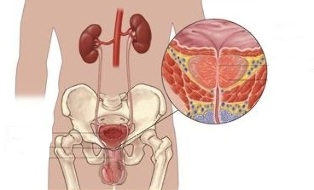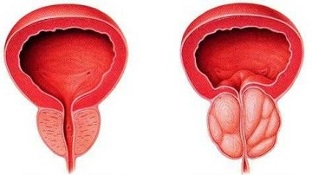The prostate gland, or prostate as it is called, is a very sensitive male organ that is exposed to various urological diseases, especially prostatitis. Despite the spread of the disease, the treatment of chronic prostatitis is a very difficult task.
types of prostatitis and causes of its development
Prostatitis is a disease of the prostate gland accompanied by an inflammatory process in the tissues. Prostatitis is classified according to the following information:
- acute bacterial prostatitis caused by infectious agents;
- chronic bacterial (infectious) prostatitis;
- chronic abacterial (non-infectious) prostatitis;
- asymptomatic inflammatory prostatitis.
Chronic bacterial prostatitis - despite many studies, the nature of this type is not fully understood. This type occurs in men as a result of an infection of the prostate gland, which is possible for several reasons:

- severe hypothermia;
- bladder emptying problem;
- unstable sex life (disorder or deficiency);
- accompanying chronic diseases of the genitourinary system;
- lead an unhealthy lifestyle;
- inaction.
Often the disease persists without obvious symptoms and is felt only in the period of exacerbation, accompanied by such symptoms:
- feeling anxious and incomplete during urination;
- decrease in sexual activity;
- Pain in the lower abdomen.
In addition, chronic prostatitis can lead to various diseases of the bladder, progress to the acute stage of the disease, and then treatment of exacerbation of chronic prostatitis is provided.
Chronic abacterial prostatitis - the incidence is 92-95% of all types of prostatitis, according to which the prevalence can be considered. There is no age limit for this disease, so it affects men of all ages, but the peak is on average thirty years. The disease is diagnosed based on the following symptoms:
- pelvic pain (more than 3 months);
- There are no signs of an infectious environment;
- Increased sexual activity and urination.
In urology, it is also possible to distinguish chronic calculus prostatitis, which in turn is the result of chronic prostatitis and is more troublesome for older men.
Can chronic prostatitis be treated?
Every patient is concerned about the effectiveness of treatment of chronic prostatitis, because the disease is not only very disturbing in its specific nature, but also carries some psychological trauma for a man.
We note that this appointment was made by a specialist on the basis of diagnostic measures, taking into account the different directions in the application of the methods. The urologist individually develops a comprehensive prostatitis treatment program that covers all therapeutic procedures. Thus, a comprehensive conservative approach includes:
- drug treatment of chronic prostatitis;
- physiotherapy;
- manual treatment.
As mentioned, a specialist selects an individual program that adjusts from the general scheme, and each individual patient has a separate course of treatment for chronic prostatitis, calculated by the attending physician.
Effective treatment of chronic prostatitis primarily involves the following additional studies:

- Consultation with a neuropsychiatrist, endocrinologist, cardiologist;
- computed or magnetic resonance imaging to study the performance and structure of the brain;
- hormonal state research;
- Ultrasound examination of the genitourinary system.
How is chronic prostatitis treated if the patient sees no symptoms? This means that the patient is in remission or the disease is asymptomatic, the latter, of course, involves an immediate visit to a specialist who will perform all the necessary procedures. The treatment conditions for chronic prostatitis are generally 2 weeks or more, depending on the condition of the prostate and the severity of the disease.
For example, medications for the treatment of chronic prostatitis require a reduction in arterial blood flow to the penis in men and regular use in combination with the disease. And to increase this blood flow and cause an erection, you need to take regular vasodilators.
Treatment of chronic prostatitis at home
In case of exacerbation of chronic prostatitis, all the recommendations described below are followed. This is a few days of bed rest, exclusion of physical activity, abstinence from alcohol. After eliminating the exacerbation of chronic prostatitis, you need to decide on your work and rest regimen for many years.
To prevent recurrence of ignition, the following basic instructions should always be followed:
- Avoid hypothermia - first of all, avoid sitting in a cold place, on concrete curbs, stones, even in hot weather. Clothes should be loose, light enough, but appropriate for the season. An excellent way to get rid of exacerbations of chronic prostatitis is to harden the body. In this case, you can use water, air baths without hardening to be outdoors for at least 1-2 hours a day.
- Regular emptying of the bladder is very important to prevent overflow and prolonged urination ("do not tolerate", go to the toilet every 3-4 hours).
- If you have a sedentary job, you should take a 3-5 minute break every hour or two to keep warm. If this is not possible, you should perform anus contractions 40-50 times in at least one approach, repeat such exercises 4-6 times a day.
- Regular moderate physical activity is one of the most important factors in preventing the development of chronic prostatitis, reducing the density in the prostate gland and pelvic organs. Such activities include at least daily morning exercises, 30-40 minutes of continuous walking at a moderate or fast pace (ie, non-stop, going to the store, etc. ). In addition, you need a weekly trip to nature with possible activities in the country, picking berries, mushrooms or long walks for 2-3 hours on weekends, visiting the pool or exercising at home in simulators (treadmill, rowing machine, stepper) in extreme conditions. ).
- If possible, rule out trauma to the perineum (regular professional cycling, equestrian sports, motocross).
- Regular sexual activity is the most important factor in relieving prostate obstruction. Moreover, restraint is important here, as sexual intercourse is in accordance with a man's sexual structure. It is important to avoid long-term and interrupted sexual intercourse, to have a regular sexual partner.
- Fight constipation.
- Abstinence from alcohol during exacerbation of prostatitis and maximum reduction in the amount of alcohol consumed in remission. This requires the complete rejection of beer and cheap wines.
- If possible, avoid work involving constant nervous tension, often stressful situations, or learn to cope with stress through automatic training, meditation.
- Clinical examination, laboratory tests of TRUS, urinary and prostate secretions, and after 40 years - and prophylactic visits to the urologist twice a year for PSA. Implementation of these simple measures will prevent the exacerbation of chronic prostatitis and help strengthen the body and its defenses.
How to treat chronic prostatitis with drugs?
The root causes of prostatitis are primarily various infections and sexually transmitted viruses that affect the urethra, which are found in the tissues of the prostate. It should be noted that when diagnosed with chronic bacterial prostatitis, treatment consists of several stages.
Treatment of bacterial prostatitis is one of the most difficult tasks of modern urology. Despite advances in diagnosis and early detection of the disease, a complete cure can be achieved in only 30% of cases. Modern therapy of bacterial prostatitis consists of several stages and can clearly answer the question: "How is chronic prostatitis treated and how accurate? " Success also largely depends on the coordination of the patient-physician chain. Thus, the main stages of treatment:
- painkillers - use of non-steroidal anti-inflammatory drugs;
- reduce anxiety - take antidepressants;
- resumption of urination;
- local treatment - douching;
- physiotherapy treatment;
- target therapy - it is recommended to take medications prescribed by a doctor for chronic bacterial prostatitis and antibiotics;
- Surgical treatment of chronic prostatitis - it is necessary to use this method in cases of narrowing of the urethra and prostate abscess.
It should be noted that these days the treatment of chronic prostatitis with antibiotics is quite justified, but on average after completing the required course of about 2 weeks. After graduation, the doctor evaluates the results and there is a more positive trend. Antibiotics are used for chronic prostatitis because the disease is caused by infectious, mainly pathogenic bacteria, and this necessarily requires antibiotic therapy. The key is to choose the right medication according to a scheme that is clearly chosen by the attending physician.
It should be noted that when taking medication for chronic prostatitis, you must strictly adhere to the timing and dosage of the prescribed treatment regimen.
It is worth remembering that there is no absolute cure for chronic prostatitis, and maximum treatment is possible only with a thorough diagnosis and compliance with all prescriptions of a specialist. Self-medication is especially harmful for this disease due to its specificity and severity.
























